Sense and Sensibility (2024)
I haven’t seen a Hallmark film in years, and I find myself largely indifferent to the charms of Bridgerton, the most prominent example of mixed-race casting I can think of that is popular at the current moment. So it would be fair to say that my expectations while approaching Hallmark’s “Mahogany Presentation” of Sense and Sensibility were…low.
The hallmark of a gentleman in Austenland is the ability to admit when he is wrong, and, well, I was wrong. The new production stays faithful to the plot of Austen’s beloved novel while highlighting themes that are embedded in it.
Jane Austen is too often thought of by modern readers as apolitical or even pro-oligarchy because she doesn’t overtly criticize the institutions and social organizations that create and maintain while, male, and class privilege. I understand this criticism, but I don’t subscribe to it. Heroines like the Dashwood sisters are often victims of unfair or capricious social organizations. Whether these are laws that females cannot inherit property or social customs that censure women for behaviors that are largely tolerated in men, they create a world in which what those oppressed know is right and what society treats as right are often in conflict. The black-and-white casting here actually underscores those injustices in a way that makes them more recognizable to audiences not steeped in the minutiae of land-transfer laws of the 18th and 19th centuries. When the Dashwood women talk about how what is right is being denied to them, we see the family distress not as a unique product of a weak-willed brother manipulated by his greedy wife but as the inevitable product of a system that gives white men absolute power to wield indiscriminately. In such systems, some of the men who wield power will be well-meaning. Some will be corrupt. Some will have good hearts but frail wills. Benevolent fathers will give little thought to the protection of their wives and daughters once they pass away.
The racial casting adds some interesting wrinkles to the Colonel Brandon/Marianne pairing. When Brandon has to leave a picnic on sudden notice and a catty remark insinuates that he has an illegitimate child, it lands differently than it did when Alan Rickman was playing the part. A self-sufficient white man as such a time could afford not to care about such gossip; what the world thinks of him is largely irrelevant so long as he is a man of means. But few Black men or women of any color have had sufficient independence to stand apart from society’s censure.
It is mostly in the Edward-Elinor courtship though that the casting defamiliarizes the material in interesting ways. In the novel and in the Ang Lee film, Edward has always struck me as a bit of a jerk and a bit of a ninny. The Lee film relies heavily on the element of surprise by focusing almost entirely on Elinor’s point of view. This highlights Elinor’s belief in Edward but often at the cost of making us wonder what she sees in him. Here we can a more direct confrontation between Edward and the matriarchy, and it is made clear to us through direct observation that Edward is a man of principle bound by his foolish youth rather than a casual flirt who develops an intimacy with a woman he could not hope to wed.
Racial stereotypes inform the way we interpret characters, even if those stereotypes are largely unconscious. Lucy’s catty cruelty toward Elinor skews differently in light of media images of conflicts between Black women. Brandon’s disgust at Willoughby’s sexually predatory ways evoked memories of A Soldier’s Play. It’s not that such conflicts are more frequent in certain racial communities; they’re not. That’s the point, though. The way that the same plot evokes different emotions when the actors are of different colors says quite a bit about how those emotions might be filtered through unconscious or embedded racial assumptions.
I have always assumed that the main purpose for anachronistic racial casting was representation — that it was beneficial for Black audiences to see themselves in a variety of roles. It was cool to experience the ways in which seeing it can defamiliarize traditional material for other audiences as well, helping us to see afresh material that we already know and love.
Sense and Sensibility premieres February 24th, 2024, on The Hallmark Channel.

